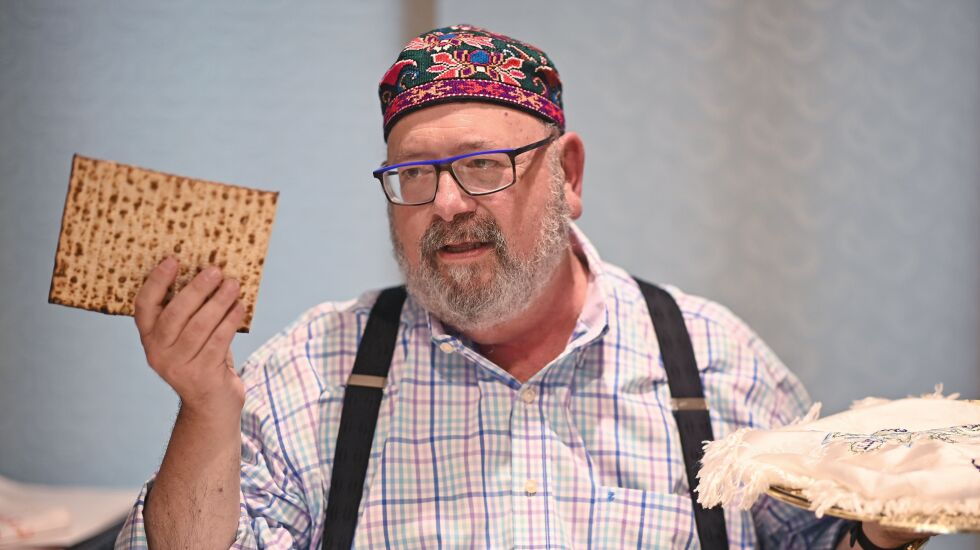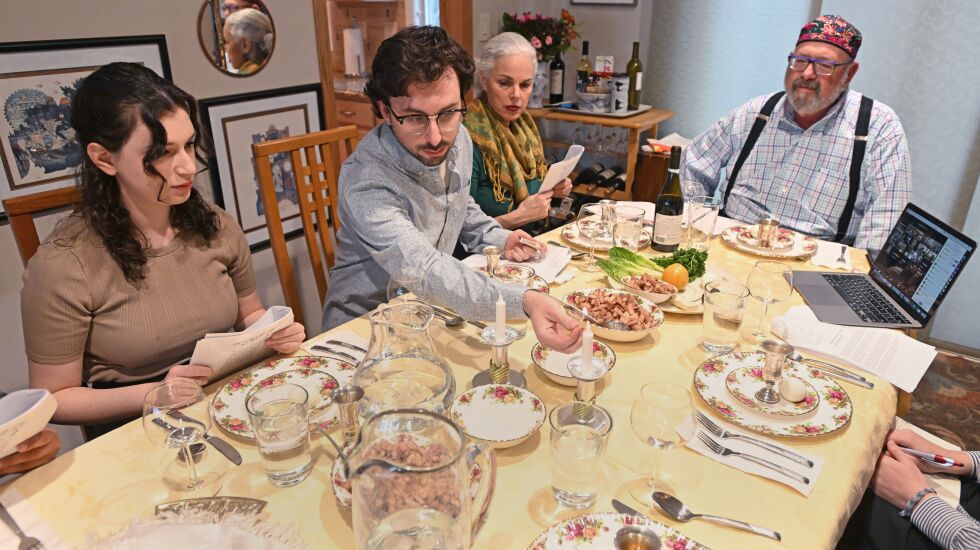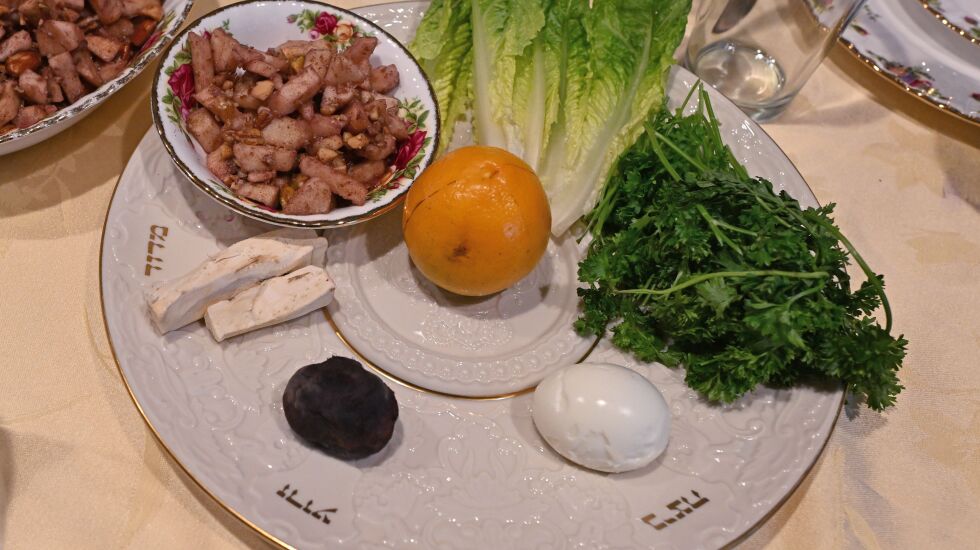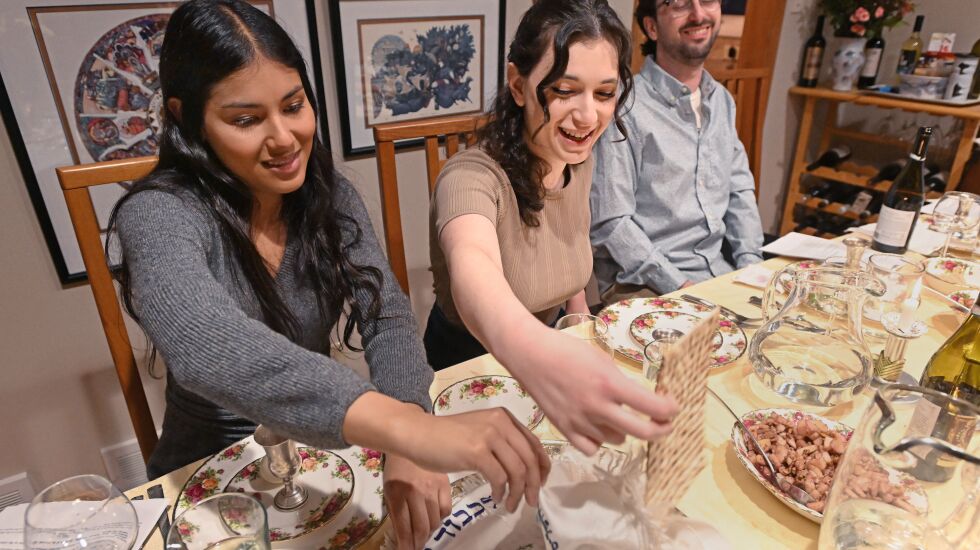
It’s not often that all five members of the Serotta family can gather under one roof. But Passover Seder is one of those occasions when Rabbi Ike Serotta can see his three children at his home in Deerfield.
Passover began at sundown on Wednesday. The Jewish holiday, which commemorates the Hebrews’ exodus from Egypt and their liberation from slavery, is typically celebrated with a ceremonial meal called a Seder on the first night or first two nights of Passover.
Ike Serotta, who is a rabbi at Makom Solel Lakeside in Highland Park, led the Seder for his daughters, Vered and Elisha, son Yehuda, wife Ceilanne Libber, and family friend Britney Wittes. Members of his congregation, family and friends also joined via Zoom.
The best part of Passover for Serotta is having his children home for Seder, especially now that all three are adults living in different cities. Yehuda, 29, lives in Denver; Vered, 27, lives in Seattle; and Elisha, 25, lives in Pittsburgh.
“It means so much to me that it means something to them,” Serotta said while as he sat in the living room before the Seder began. Serotta wore a colorfully patterned kippah, a traditional head covering worn by Jewish men.

The holiday lasts a week, during which those who celebrate cannot consume anything made with yeast, including bread and beer. Instead, Serotta said, they eat unleavened matzo bread to recall the time their ancestors ate bread made only from flour and water.
Serotta said Passover is typically celebrated more within the home than at a synagogue. In the Serotta home, a Passover Seder includes a few special touches, like vegetarian options for Vered and Elisha.
Seder at the Serottas also includes a document the family lovingly calls the “Serotta Haggadah.” A Haggadah is a text that dictates the order of a Passover Seder. Theirs is a “living document,” Libber said. Serotta and other members of the family have modified the list of prayers and songs included in the Serotta Haggadah over the course of many years.
The meal involves 14 symbolic steps, including breaking and hiding the matzo and dipping bitter herbs in salt water, which Yehuda said is one of his favorite parts of the meal. Dipping the bitter herbs in salt water symbolizes the tears of the Hebrew slaves in Israel.
“Wow, that’s a lot of tears,” Libber said, laughing, as she ate her salty herbs.
Seder services also include singing both before and after the meal. The Serottas sang songs in Hebrew, English and Aramaic, including traditional prayers and blessings, and even an English song set to the tune of “Oh My Darling, Clementine.”
The rabbi led a service that touched on modern issues, as well as the traditions of Judaism. He opened with a quote from Justice Ruth Bader Ginsburg, and the family left an empty seat at their table in honor of Wall Street Journal reporter Evan Gershkovich, who was arrested in Russia last week.
“We pray that our experience tonight helps us ignite the spark of justice within each of us,” Serotta said during his service.
After the Serottas ate their meal, which included Jewish delicacies like matzo ball soup and brisket, Yehuda, Vered, Elisha and Wittes searched for the hidden matzo, or afikomen. This is usually a task for the children at a Seder, but Wittes, 25, found the bread hiding in the mailbox by the front door.
The meal ended with dessert baked using a special family recipe for chocolate cake. Serotta concluded the service for his Zoom congregation, but not before the family dog Mavis almost knocked his laptop off the table a few times. A Seder service traditionally concludes with the phrase “Next year in Jerusalem,” but in his service, Serotta added the phrase “Next year in a world of peace.”
Serotta said celebrating Passover is about “empathy” and “asking questions.” He added that the holiday encourages people to find a “connection to the creator” and “relive the exodus.”









